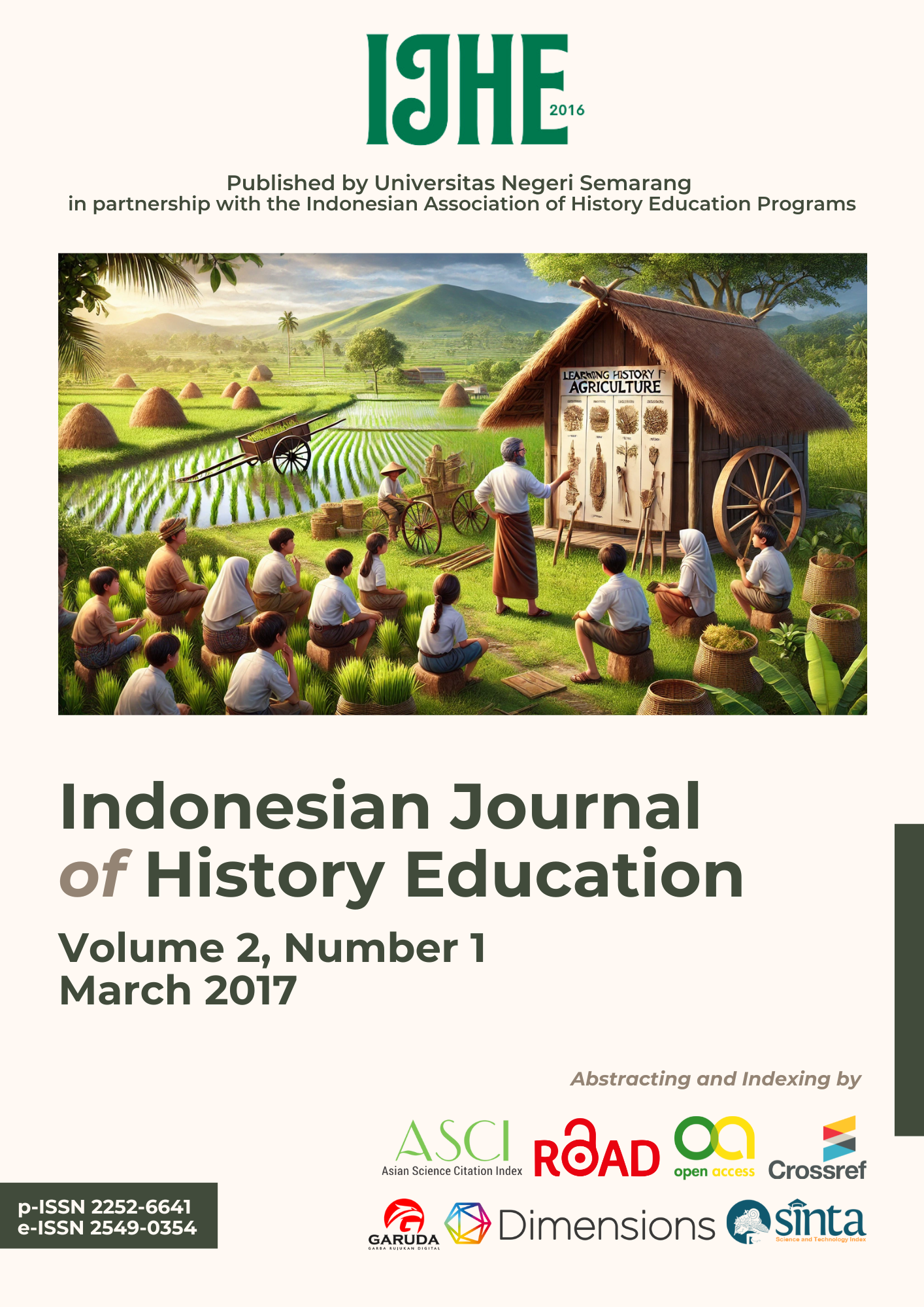Use of Electronic School Books (BSE) as a Resource Learning in the Historical Social Studies Learning Process in SMP Negeri 1 Batang
Abstract
This study aims to determine the understanding and use of BSE in social studies learning history and the effective use of Electronic School Books as a learning resource in SMP Negeri 1 Batang. This research is qualitative. Informants in this study were social studies teachers, students, principals, BOS treasurer, and librarian. The data was obtained through interviews, observation, and documentation. This research focuses on understanding how teachers and students use BSE and its effectiveness. The selection technique for informants in this study is purposive sampling. The results use BSE as a learning resource in the history of social studies learning has not been effectively implemented due to a lack of understanding of teachers and students regarding BSE and the lack of utilization of school facilities to support the implementation of electronic learning systems, especially BSE.
References
Anneahira. (2012). Buku Elektronik, Teknologi Buku Digital. http:// http://www.anneahira.com/bukuelektronik.htm. (13 January 2013).
Arikunto, Suharsimi. (2010). Prosedur Penelitian Suatu Pendekatan Praktek. Jakarta: PT. Rineka Cipta.
Darwanti. (2011). Pemanfaatan Buku Teks Oleh Guru Dalam Pembelajaran Sejarah. Dalam Paramita. No.1. Hal 75-85.
Daryanto. (2010). Media Pembelajaran. Yogyakarta : Gava Media
Dewanto. (2005). Metodologi Penelitian, Tinjauan Filosofis dan Praktis. Semarang: UPT UNNES Press.
Effendi, Empy dan Hartono Zuang. (2005). E-Learning, Konsep, Dan Aplikasi. Yogyakarta : CV Andi Offset
Hamdani. (2011). Strategi Belajar Mengajar. Bandung : Pustaka Setia.
Haris, D. (2011). Panduan Lengkap E-Book. Yogyakarta : Cakrawala
Hasan, Vicky Fauzi. (2009). Folklor Masjid dan Makam Sultan Hadlirin Sebagai Pengayaan Materi Pembelajaran IPS Sejarah. Skripsi. Semarang : Fakultas Ilmu Sosial UNNES.
Kementrian Pendidikan Nasional. (2013). BSE. http://bse.kemendiknas.go.id/#. (13 January 2013).
Kochhar. (2008). Teaching History; Pembelajaran Sejarah. Terjemahan Purwanta dan Yovita Hardiwati. Jakarta : PT Gramedia.
Mark K. Smit, dkk. (2010). Teori Pembelajaran Dan Pengajaran. Jakarta : Mirza Media Pustaka
Moleong, Lexy. (2011). Metodologi Penelitian Kualitatif. Bandung : PT Remaja Rosdakarya.
Nasution. (2004). Penelitian Research (Penelitian Ilmiah). Jakarta : Bumi Aksara.
Prastowo, Andi. (2012). Panduan Kreatif Membuat Bahan Ajar Inovatif. Yogyakarta : Diva Press
Prawiradilaga, Dewi Salma. (2012). Wawasan Teknologi Pendidikan. Jakarta : Kencana Prenaga Media Grup
Pusat Kurikulum Dan Perbukuan. (2013). BSE. http://puskurbuk.net/web/bse.html. (13 Januari 2013)
Sudjana, Nana dan Ahmad Rivai. (2007). Teknologi Pengajaran. Bandung : Sinar Baru.
Sugandi, Ahmad, dkk. (2004). Teori Pembelajaran. Semarang : UPT MKK UNNES
Sugiyono. (2012). Metode Penelitian, Kualitatif. Bandung: Alfa beta
Sukmadinata, N. S. (2010). Metode Penelitian Pendidikan. Bandung : PT Remaja Rosdakarya.
Syah, Muhibbin. (2003). Psikologi Belajar. Jakarta : Raja Grafindo Persada
Undang-Undang No 20 Tahun 2003 tentang Sistem Pendidikan Nasional
Wena, Made. (2009). Strategi Pembelajaran Inovatif Kontemporer. Jakarta : Bumi Aksara
Widja, I Gde. (1989). Sejarah Lokal Suatu Perspektif Dalam Pengajaran Sejarah. Jakarta: Depdikbud.
Wikipedia. (2013). Buku. http//www.id.wikipedia.org/wiki/buku. (13 Januari 2013).
Copyright Notice
An author who publishes in the Jurnal Indonesian Journal of History Education agrees to the following terms:
- Author retains the copyright and grants the journal the right of first publication of the work simultaneously licensed under the Creative Commons Attribution-ShareAlike 4.0 License that allows others to share the work with an acknowledgement of the work's authorship and initial publication in this journal
- Author is able to enter into separate, additional contractual arrangements for the non-exclusive distribution of the journal's published version of the work (e.g., post it to an institutional repository or publish it in a book) with the acknowledgement of its initial publication in this journal.
- Author is permitted and encouraged to post his/her work online (e.g., in institutional repositories or on their website) prior to and during the submission process, as it can lead to productive exchanges, as well as earlier and greater citation of the published work (See The Effect of Open Access).
Read more about the Creative Commons Attribution-ShareAlike 4.0 Licence here: https://creativecommons.org/licenses/by-sa/4.0/.




